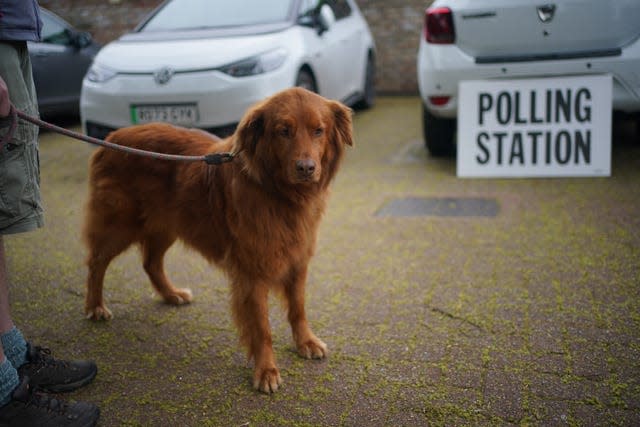Boris Johnson turned away from polling station after forgetting photo ID
Former prime minister Boris Johnson was turned away from a polling station after forgetting to bring a photo ID.
The PA news agency understands Mr Johnson was told by polling station staff he would not be able to vote without proving his identity.
The requirement to provide photo ID was introduced by Mr Johnson during his time in Downing Street as part of the Elections Act 2022.
It is understood Mr Johnson was later able to vote, and that he voted Conservative.

Thursday’s election is the first time many voters in England and Wales have had to present ID to vote under provisions first rolled out at last year’s local elections.
Acceptable forms of ID include a passport, driving licence, Proof of Age Standards Scheme (Pass) cards, Blue Badges, and some concessionary travel cards.
The Government has also said it intends to make veterans’ ID cards a valid form of voter identification after former service personnel were turned away from polling stations.
I am sorry about this.
The legislation on acceptable forms of ID came out before the veterans ID cards started coming out in January this year. I will do all I can to change it before the next one. https://t.co/COY0n6vIEo
— Rt Hon Johnny Mercer (@JohnnyMercerUK) May 2, 2024
Veterans minister Johnny Mercer apologised to those who had been unable to use their veterans’ ID card to vote in the local elections on Thursday, vowing to “do all I can” to have it added to the list of valid identification.
A Number 10 spokeswoman said: “It is our intention for the new Veteran Card, which was rolled out in January, to be added to the official list.”
The Government is consulting on adding the card to the list of acceptable voter ID, which already includes armed forces identity cards.
Mr Mercer’s apology came after Army veteran Adam Diver complained he had been turned away from his local polling station after presenting his Veteran Card.
Army veteran Mr Diver, 48, had been looking to place his vote in Fleetwood, Lancashire, but was turned away after presenting his card, saying the experience left him feeling “gutted”.
“I felt clearly deflated, I felt gutted to be fair and upset – I felt angry at the point,” Mr Diver, who served in the Army for 27 years, told the PA news agency.
“I felt like my time served was invalidated and I just thought to myself, ‘what was the point in that?’
“I’ve served in pretty much every war going, I’ve spent 27 years away from my family.
“I thought you could use it as an ID card. It’s like a driving licence, you can’t get any more official and it didn’t strike me one bit that it wouldn’t be validated.”
Labour said the Government has had years to ensure the Veteran Card was included on the list of valid voter ID, having begun rolling out the cards in 2019.
Meanwhile, a Conservative MP has said his dyspraxia caused him to misplace his photo ID, forcing him to arrange an emergency proxy vote for Thursday’s local elections.
Tom Hunt, who represents Ipswich, warned people “persecuting” him online to be “very careful with their words”, saying it is “well known that sadly we are slightly more prone to lose things”.
He told PA: “I don’t want to blame everything on my dyspraxia but it’s a factor in my life I have to deal with.
“It’s all well and good people saying we need to have more neurodiverse Members of Parliament, but having a massive pile-on on them, I don’t think it’s going to encourage more people.”
People whose ID has been lost, stolen or damaged can apply for an emergency proxy vote until 5pm on polling day, allowing someone else to vote on their behalf.
Mr Hunt said he had not previously been aware of this provision, but had applied for an emergency proxy vote, saying it is “the system working well”.
Downing Street said it had no wider concerns about the operation of the voter ID requirement, adding that only 0.25% of would-be voters had been turned away from polling stations for lacking the correct documents.
The Electoral Commission said “most voters” were able to cast their ballots despite the ID requirements.
“Our initial assessment of the elections is that they were well-run, and millions of voters were able to exercise their democratic rights,” a spokesman said.
“This is a testament to the efforts of electoral administrators, who work tirelessly to ensure the smooth delivery and integrity of polls.”

 Yahoo News
Yahoo News 
